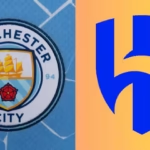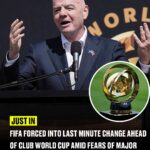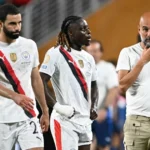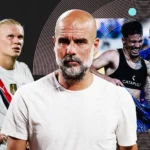£62.5m star told Pep Guardiola he was not happy about ‘his situation’ during Man City vs Al Hilal
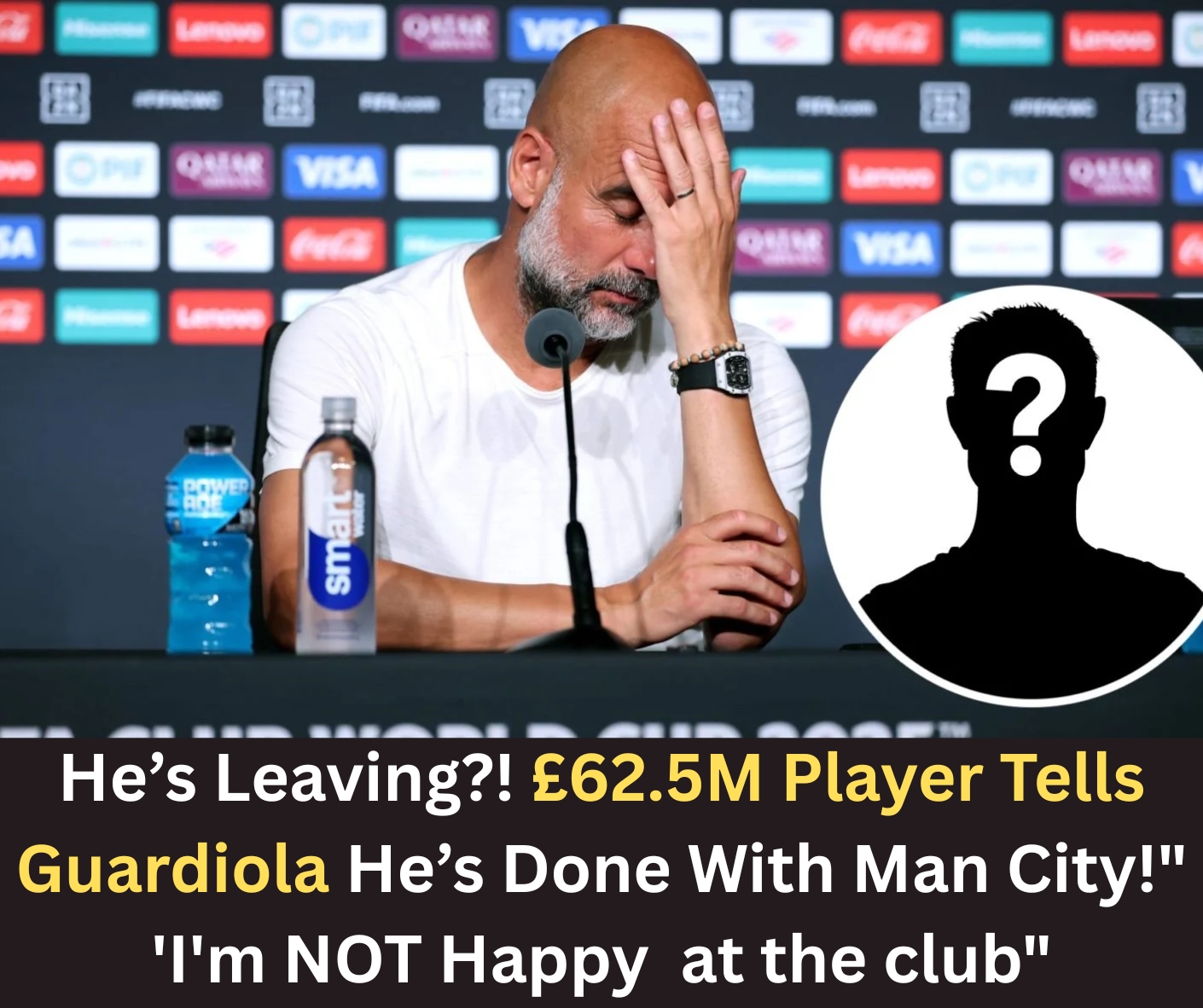
Manchester City’s ambitious quest to transform their disappointing 2024/25 campaign into a triumphant new era has encountered yet another significant obstacle. The Premier League giants’ participation in the FIFA Club World Cup, which was intended to serve as a positive catalyst for the upcoming season, ended in bitter disappointment following a dramatic 4-3 defeat to Saudi Arabian side Al Hilal in the United States. This result not only eliminated Pep Guardiola’s men from the prestigious tournament but also highlighted persistent structural issues that continue to plague one of football’s most successful clubs of the past decade.
The defeat represents more than just a single match loss; it symbolizes the ongoing challenges that Manchester City face as they attempt to reclaim their position at the pinnacle of world football. Despite the presence of world-class talent and one of the most celebrated managers in the sport, the club finds itself grappling with fundamental problems that have carried over from their underwhelming previous season.
The Al Hilal Defeat: A Microcosm of Deeper Issues
The match against Al Hilal unfolded as a classic example of Manchester City’s current predicament. Despite taking an early lead through Bernardo Silva’s opening goal, the team’s inability to capitalize on their dominance would prove costly. The Portuguese midfielder’s strike appeared to set the foundation for a commanding performance, with City creating multiple opportunities to extend their advantage in the opening period.
However, the narrative shifted dramatically after halftime, as Al Hilal demonstrated the kind of clinical efficiency and tactical discipline that has become increasingly problematic for Guardiola’s side to handle. The Saudi club’s ability to exploit transitional moments and punish City’s defensive vulnerabilities exposed the same weaknesses that plagued the Manchester outfit throughout their challenging 2024/25 campaign.
The match’s progression into extra time and the eventual 4-3 scoreline painted a picture of a team struggling with consistency and defensive stability. While City’s attacking prowess remained evident through their three goals, their inability to control the game’s tempo and prevent dangerous counter-attacking situations highlighted fundamental tactical issues that extend far beyond individual performances.
Rodri’s Injury Concerns: A Critical Blow to City’s Prospects
Perhaps the most significant concern emerging from the Al Hilal encounter centers around Rodri’s fitness status. The Spanish midfielder, whose absence during the majority of the 2024/25 season due to a long-term knee injury significantly impacted City’s performance levels, experienced discomfort during his return to action against the Saudi side.
Rodri entered the match as a substitute in the 53rd minute, representing his gradual reintegration into competitive football following his extended rehabilitation period. However, his premature departure in the 100th minute due to physical discomfort has raised alarm bells throughout the Manchester City organization and fanbase.
The £62.5 million midfielder’s importance to City’s tactical system cannot be overstated. Since his arrival from Atletico Madrid in 2019, Rodri has evolved into the fulcrum of Guardiola’s midfield, providing the defensive solidity and ball distribution that underpins the team’s possession-based approach. His absence last season coincided with City’s most disappointing campaign in recent memory, underscoring his irreplaceable value to the squad.
Guardiola’s post-match comments regarding Rodri’s situation revealed the midfielder’s own concerns about his physical condition. “Rodri – he complained about his situation,” the Catalan manager disclosed, indicating that the player himself felt uncomfortable during the match. While initial assessments suggest the issue is unrelated to his previous knee injury, any fitness concerns surrounding the 2024 Ballon d’Or winner represent a significant worry for City’s upcoming Premier League campaign.
The timing of this setback is particularly concerning given Rodri’s gradual return to full fitness. Similar to other players recovering from long-term injuries, such as Oscar Bobb’s recent experiences, the risk of secondary injuries during the rehabilitation process remains elevated. The medical staff’s challenge now lies in managing Rodri’s recovery while ensuring his availability for the crucial early weeks of the new season.
Rayan Cherki’s Emotional Response: A Symbol of City’s Ambitions
The aftermath of the Al Hilal defeat provided a poignant moment that encapsulated the emotional investment and high expectations surrounding Manchester City’s new signings. Rayan Cherki, the talented French midfielder acquired from Lyon, was visibly distraught following the elimination, shedding tears as he embraced Pep Guardiola on the sideline.
Cherki’s emotional response reflects the ambitious mentality that City seeks to cultivate among their players. Despite being a recent arrival and having limited opportunities to establish himself as a regular starter, the young Frenchman’s devastation at the tournament exit demonstrates his commitment to the club’s success and his personal desire to contribute meaningfully to their objectives.
The former Lyon player’s performance statistics from his substitute appearance against Al Hilal showcase his potential impact on City’s attacking play. Recording one assist, creating two chances, completing 31 of 38 passes with an 82% accuracy rate, and successfully executing one dribble, Cherki demonstrated the technical qualities and creative vision that attracted City’s interest in the first place.
His ability to operate in central areas and create opportunities from deeper positions addresses a specific need within City’s squad composition. The Frenchman’s skill set offers Guardiola tactical flexibility and the potential to unlock defensive structures through individual brilliance and precise passing. However, his late introduction in the 91st minute against Al Hilal suggests that Guardiola still requires time to fully integrate Cherki’s talents into his tactical framework.
The sight of Cherki in tears following the defeat serves as a reminder of the expectations and pressure that accompany wearing the Manchester City shirt. For a player of his age and relative inexperience at the highest level, such moments can prove formative in developing the mental resilience required to succeed at an elite club.
Persistent Defensive Transition Problems
Bernardo Silva’s post-match analysis provided crucial insight into the recurring issues that continue to undermine Manchester City’s defensive stability. The Portuguese captain’s identification of transitional defending as a primary concern echoes criticisms that plagued the team throughout their disappointing 2024/25 campaign.
Silva’s candid assessment highlighted City’s ongoing struggle to control games when possession is lost. “Especially controlling transitions because the ball we had again, the chances we had again. After all, we scored three and could’ve scored five, six,” Silva explained to DAZN. “It was all about controlling when we lost the ball, controlling the transitions, don’t let them run, and they ran way too many times!”
This tactical vulnerability has become increasingly problematic for Guardiola’s side, representing a departure from the suffocating possession-based approach that previously characterized their most successful periods. The inability to effectively manage transitional moments allows opponents to exploit spaces behind City’s advanced defensive line, creating dangerous attacking opportunities with minimal build-up play.
The frequency with which Al Hilal threatened City’s goal through quick transitions exemplifies this weakness. Silva’s observation that “with one, two passes, there was always a feeling of danger coming from them” underscores the ease with which opponents can penetrate City’s defensive structure when the ball changes hands.
This systemic issue extends beyond individual defensive errors or goalkeeper mistakes, representing a fundamental tactical challenge that requires comprehensive solutions. The problem’s persistence from the previous season into the current pre-season period suggests that addressing these transitional weaknesses must become a priority for Guardiola and his coaching staff.
The entertainment value that Silva mentioned – City becoming “a much more entertaining side to watch in recent weeks compared to last season” – comes at the cost of defensive solidity. While attacking spectacle may please neutrals, the trade-off between entertainment and effectiveness could prove costly in competitive situations where defensive resilience often determines outcomes.
Guardiola’s Tactical Decisions Under Scrutiny
Pep Guardiola’s management during the Al Hilal encounter has drawn criticism from various quarters, with particular focus on his substitution timing and tactical adjustments. The decision to introduce key players like Rayan Cherki only in the 91st minute has been questioned as potentially contributing to the defeat.
Guardiola’s reputation as a tactical innovator and master of in-game adjustments makes such criticisms particularly significant. His ability to read matches and make decisive interventions has been instrumental in City’s numerous successes under his leadership. However, the Al Hilal result suggests that even experienced managers can misjudge crucial moments in important matches.
The late introduction of impact players raises questions about squad rotation and the balance between experimentation and results. While pre-season tournaments often serve as opportunities to assess squad depth and integrate new signings, the stakes of the Club World Cup demanded a more results-oriented approach that may have conflicted with Guardiola’s developmental objectives.
The Spanish manager’s post-match comments regarding various players’ performances and fitness levels indicate his ongoing evaluation of squad capabilities ahead of the new Premier League season. However, the elimination from the Club World Cup represents a missed opportunity to build momentum and confidence within the group.
Guardiola’s challenge now involves learning from this setback while maintaining the squad’s morale and focus on upcoming objectives. His ability to analyze defeats constructively and implement necessary adjustments will be crucial in determining City’s prospects for the 2025/26 campaign.
Squad Depth and Integration Challenges
Manchester City’s recruitment strategy ahead of the Club World Cup, including the acquisition of Tijjani Reijnders and three other players, reflects their commitment to addressing squad deficiencies and enhancing competitive depth. However, the integration of new signings into established tactical systems presents ongoing challenges that extend beyond individual quality.
The process of assimilating new players while maintaining tactical cohesion requires time and patience that competitive football often doesn’t afford. Players like Cherki possess undeniable talent but require opportunities to develop understanding with teammates and adapt to Guardiola’s demanding tactical requirements.
The depth question becomes particularly acute when considering City’s aspirations across multiple competitions. The Premier League’s intensity and the Champions League’s demands require squad rotation capabilities that can maintain performance standards regardless of personnel changes. The Al Hilal defeat highlighted potential vulnerabilities in this regard, suggesting that squad integration remains a work in progress.
City’s recruitment philosophy has traditionally emphasized players who can seamlessly adapt to Guardiola’s tactical principles while providing unique qualities that enhance overall squad flexibility. The success of this approach will be measured not only by individual performances but by the collective ability to maintain competitive standards across all competitions.
Fan Expectations and Criticism
The reaction from Manchester City supporters following the Al Hilal defeat reflects the high standards and expectations that success has created within the fanbase. Criticism directed at specific players, including goalkeeper Ederson, demonstrates the scrutiny that accompanies elite-level football and the pressure on individuals to maintain consistent performance levels.
Fan demands for certain players to be sold following disappointing results illustrate the sometimes volatile relationship between supporter expectations and player reality. The £35 million player referenced in fan criticism represents the kind of significant investment that creates pressure for immediate returns and tangible contributions to team success.
However, supporter frustration also reflects genuine concern about the club’s direction and competitive prospects. The transition from a period of unprecedented success to relative uncertainty creates anxiety about maintaining elite status in increasingly competitive domestic and European competitions.
The challenge for City’s leadership involves managing these expectations while providing realistic assessments of the team’s development process. Building sustainable success requires patience and strategic planning that may conflict with immediate demands for results and individual accountability.
Looking Forward: Premier League Preparation
Manchester City’s elimination from the Club World Cup shifts focus entirely to their Premier League preparation and the crucial weeks leading up to the new season. The lessons learned from the Al Hilal defeat, while disappointing, provide valuable insights into areas requiring immediate attention and improvement.
Guardiola’s emphasis on addressing transitional defending represents a clear priority for the remaining preparation period. Training sessions and friendly matches must focus on improving coordination between attacking phases and defensive recovery, ensuring that the team can maintain competitive balance without sacrificing either creative output or defensive stability.
The fitness and integration of key players like Rodri will be monitored closely, with medical staff working to ensure optimal preparation for the season’s opening fixtures. The Spanish midfielder’s availability and performance level could significantly influence City’s early-season results and overall campaign trajectory.
Similarly, the development of newer signings like Cherki requires continued attention to tactical education and practical integration. These players represent significant investments in the club’s future and must be given opportunities to contribute meaningfully while adapting to the unique demands of English football.
Transfer Market Implications
The Club World Cup elimination and the issues it highlighted may influence Manchester City’s remaining transfer market activity. Guardiola’s post-match comments about wanting additional reinforcements suggest that the current squad may still require strengthening in specific areas.
The identification of defensive transition problems could prompt renewed interest in players who specialize in breaking up play and providing additional midfield protection. Similarly, the need for greater squad depth in attacking areas might accelerate pursuits of versatile forwards who can contribute across multiple positions and tactical systems.
City’s financial capabilities and reputation remain significant advantages in the transfer market, but competition for elite players continues to intensify. The club’s ability to attract and integrate quality additions while maintaining squad harmony will be crucial in determining their competitive prospects for the upcoming season.
Conclusion: Lessons and Opportunities
Manchester City’s Club World Cup exit represents a sobering reminder that elite football success requires constant adaptation and improvement. The defeat to Al Hilal, while disappointing, provides valuable lessons about current squad limitations and tactical vulnerabilities that must be addressed before competitive action resumes.
The challenges identified – defensive transitions, player integration, fitness management, and tactical consistency – are not insurmountable but require dedicated attention and strategic solutions. Guardiola’s track record of responding positively to setbacks provides optimism about the team’s ability to learn and improve from this experience.
The emotional investment demonstrated by players like Cherki and the analytical honesty shown by veterans like Silva suggest a squad committed to addressing current deficiencies and returning to winning ways. However, the transformation from promise to performance requires sustained effort and strategic patience that balances immediate needs with long-term development objectives.
As Manchester City prepares for another Premier League campaign, the lessons from their Club World Cup elimination must inform both tactical preparation and transfer market decisions. The gap between expectation and reality highlighted by the Al Hilal defeat serves as motivation for comprehensive improvement across all aspects of the club’s operations.
The coming weeks will prove crucial in determining whether this setback becomes a catalyst for positive change or a harbinger of continued struggles. City’s response to adversity has historically defined their character and success – a tradition that must continue if they are to reclaim their position at the pinnacle of English and European football.
